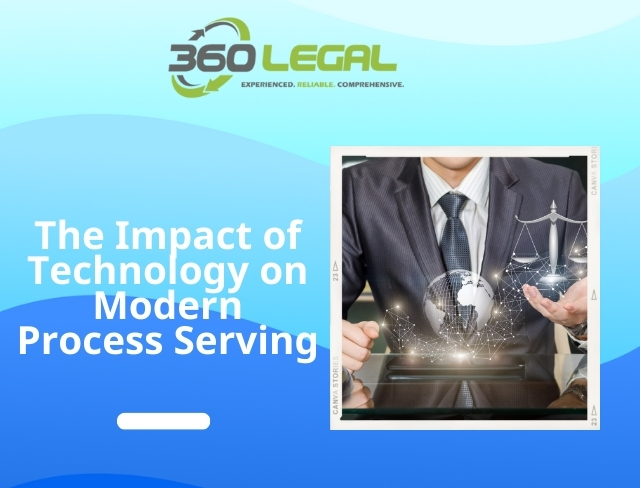Testing RSS Feeds.. ignore post.
Testing RSS Feeds.. ignore post.
The Impact of Technology on Modern Process Serving

Process serving has come a long way from the gumshoe detectives tracking down defendants in old movies. These days, technology transforms every aspect of document delivery and legal notification services.
Automation Streamlines Workflows
Tedious administrative tasks like filling out forms and locating assets are now automated. Court case data APIs automatically pull in information needed for serving. APIs (Application Programming Interfaces) play a crucial role in integrating process service software, such as case management systems, with other platforms and services. By acting as intermediaries, APIs enable seamless data exchange and communication between different software applications, streamlining workflows and enhancing operational efficiency for process servers.
The following is a DRAMATIZATION AND IS NOT AN ACTUAL EVENT: Let’s imagine a high-asset divorce case involving real estate properties, financial accounts, and minor children. By tapping into relevant databases, an automated workflow can identify and extract current contact details, asset details, identity verification, jurisdictional constraints, and mandatory form fields. This instantly populates all the required documents for a complex multi-state service in line with all legal requirements.
Data Access Increases Accuracy
Integrations with various official databases give process servers unprecedented access to verify data. Real-time checking against public and commercial datasets confirms up-to-date contact coordinates, valid identities, correct property records, and more to ensure accurate and lawful service.
The following is a DRAMATIZATION AND IS NOT AN ACTUAL EVENT: In one dramatization, a skip trace lifted the most recent address from credit reports and DMV records to pinpoint the whereabouts of someone intentionally evading a court summons. By uncovering their new unlisted phone number and place of employment, the servers achieved personal service despite the subject’s attempts to hide their location.
Leveraging Technology to Streamline Process Service Operations
In the fast-paced world of process service, efficiency and accuracy are paramount. By embracing advanced software solutions, process serving companies can streamline their operations, maximize productivity, and ensure regulatory compliance. Route optimization software plans the most efficient paths for process servers to follow. Digital forms standardize documentation and error-check filings for flaws.
From case management platforms that centralize client information and track case progress, to mobile apps that facilitate real-time updates and seamless communication, the right software tools can revolutionize the way process servers manage their workloads. Automated scheduling and dispatch features ensure that cases are assigned to the right process server at the optimal time, reducing delays and missed deadlines.
Furthermore, integration with third-party data sources, such as skip-tracing services and public records databases, empowers process servers with up-to-date information, enhancing their ability to locate and serve individuals efficiently. By leveraging these technological advancements, process serving companies can streamline their operations, minimize errors, and provide superior service to their clients while maintaining regulatory compliance.
Communication Improves Accountability
From GPS tracking to instant messaging, a suite of modern communication functionalities provides transparency between process servers and their clients. Legal teams enjoy round-the-clock visibility into document status while servers benefit from constant coordination. Route optimization software plans the most efficient paths for process servers to follow. Digital forms standardize documentation and error-check filings for flaws.
The following is a DRAMATIZATION AND IS NOT AN ACTUAL EVENT: By monitoring real-time GPS tracking, a process serving firm’s dispatch department noticed unusual extended stops on what should have been a quick routine service. After some IM exchanges, they learned the server’s car had broken down and dispatched a backup to complete the service on time per the client’s urgent instructions.
Benefits to Customers
Savvy companies invest in technology to enhance process serving for clients, improve accountability, and realize operational efficiencies. Law firms reap rewards like faster turnaround times, increased due diligence, and cost savings. Most importantly, your case benefits from coordination and a higher likelihood of effective service.
Digital Proof of Service Upgrades Verification
Process servers create an official record verifying date, time, location, and manner of service. Digital proof of service enhances verification through timestamped, geo-tagged documentation rather than just paper forms.
The following is a DRAMATIZATION AND IS NOT AN ACTUAL EVENT: In one fictional case, a court date arrived but the defense claimed they were never properly served, hoping to delay proceedings. However, the process serving company provided digitally signed GPS records showing the defendant was personally served at 24 University Ave at 3:15 p.m on April 5th. This neutralized the claim and allowed the court date to proceed as planned.
Digital verification also includes:
- Date, time, and location stamps on photos documenting service
- IP address records confirming access to critical documents
- Geo-fenced area alerts when subjects enter/exit specific locations
- Real-time status viewable to clients throughout service attempts
Unlike paper forms which get lost or damaged, digital proof provides durable long-term documentation. Courts increasingly expect high-tech evidence from tech-enabled process servers.
Emerging Technologies on the Horizon
Process serving continuously evolves as new technologies emerge. On the horizon, artificial intelligence and augmented reality could further transform legal notification services.
AI-powered tools can scan documents to automatically highlight relevant names, addresses, deadlines and jurisdictions. This extracts key data to begin verification and paperwork without human effort.
As these innovations develop, early adopters who partner with tech-forward process serving companies can gain a competitive advantage. They benefit from increased efficiency and reduced costs before the capabilities become industry-wide.
Stay Ahead of Change
Legal notification technology sees rapid transformation as new digital capabilities multiply. Our service keeps pace with the latest advances to provide advantage to clients. Partner with us to leverage innovations before competitors, while equipping your case with smoother workflows and enhanced proof.
Conclusion
Process serving powered by cutting-edge technology provides vast advantages over old-school manual methods. As misguided perceptions from movies and TV fall away, innovative real-world techniques take center stage. Contact our tech-enabled process servers to see how upgraded service makes your case flow more smoothly while saving time and money.
FAQs
1. What are some examples of digital proof of service?
Examples include timestamped photos, GPS records, geo fencing alerts, IP logging, and real-time status dashboards that provide enhanced verification over paper forms.
2. How does technology make process servers more accountable?
From GPS tracking to digital proof of service, technology allows unprecedented visibility into process servers’ actions and location history so clients always know service status.
3. What are some examples of automation in process serving?
Examples include using APIs to automatically populate forms, route optimization to map efficient routes, and digital workflows to standardize documentation across different service types.
Stop wasting time tracking down subjects and completing manual paperwork. Our tech-powered process servers upgrade service and accountability. Get in touch today to discuss your case needs!
Author
We are Social!
Latest tweets
Popular Tags
Testimonials
"5 star service ! prompt serving, helpful, professional . "
"Mike is awesome. Our firm has hired him on several occasions and we are very happy with his work. His prompt serving, helpful, professional and always in communication. I recommend him highly! "
"360Legal provides speedy and easy to use Process Service that is flexible, and very transparent with nearly instant reporting. It is very helpful for us to be able to track the status of our process service jobs, especially when they are time sensitive. "
Latest News
-

RMAI 2021 Annual Conference RMAI Annual Conference
April 12-15, 2021 -

NATIONAL CREDITORS BAR ASSOCIATION 2020 SPRING CONFERENCE
May 19-21, 2021 -

ALFN ANSWERS 2021
Jul 18-21, 2021 -

Annual Convention and Expo
Oct. 17-21, 2021 -

Florida Association of Professional Process Servers 33rd Quarter Board Meeting/Professional Beach Getaway
Aug. 20-22, 2021












